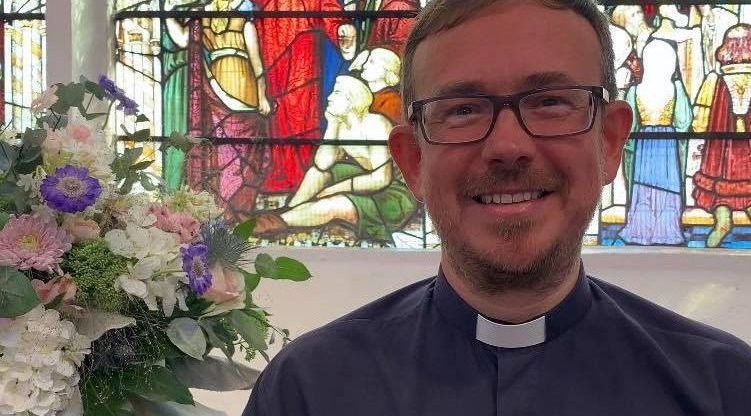Church of England invites professor who thinks LGBT+ Pride is ‘endangering to the soul’ to give official sermon

Lee Gatiss, who believes being LGBT+ is “immoral”, will give the official Church of England Sunday service on August 9. (Lee Gatiss/ Facebook)
An anti-LGBT+ professor is set to deliver the official Church of England Sunday service, despite the church’s insistence that it denounces homophobia.
Lee Gatiss, a lecturer in church history at the Union School of Theology who believes being LGBT+ is “immoral“, is set to give the official Church of England online service on Sunday (August 9), which ironically will focus on “kindness and mercy”.
Also director of the traditionalist Church Society, Gatiss often uses his platform to speak out against LGBT+ rights, and has a long history of opposing any step towards LGBT+ inclusion in the Church of England.
In 2018, when Wells Cathedral announced that it would hold a Rainbow Eucharist to “celebrate and promote greater inclusion for gay people” in the Church of England, Gatiss expressed his outrage in a Church Society blog post.
He wrote: “Rainbow Eucharists are not just blasphemy; they politicise the sacrament in an entirely unhelpful and indeed sacrilegious way.”
In December of the same year, the Church of England released guidelines approved by the House of Bishops allowing trans people to be baptised to recognise their transition.
Gatiss vehemently opposed this decision, and even had a letter on the subject published in the Church of England newsletter, in which he wrote: “We are told blithely to accept trans ideology and celebrate gender transitions, using a cheekily repurposed baptism liturgy that allows pronouns such as ze , zim and zir.”
He added: “This surely is a spiritual travesty, being based on no theological or scientific grounds… What will [the House of Bishops] do now to mitigate or reverse this unprecedented capitulation to the demands of the LGBT lobby?”
Even the sight of a cathedral flying a rainbow flag during Pride month was too much for Gatiss.
When Ely Cathedral chose to raise a Pride flag during the city’s Pride celebrations, the anti-LGBT+ Anglican wrote on Facebook: “Why is a Church of England cathedral promoting what is described as ‘primarily a lesbian, gay, bisexual and transgender celebration’?
“They are not naive, and know what they are doing. The flag will no doubt be a rainbow, but in reality it is a white flag, signalling their surrender of Christianity in favour of a completely different gospel, which is divisive in the church and endangering to the soul… God says, ‘pride comes before destruction’.”
Christian LGBT+ activist ‘outraged’ by Lee Gatiss.
Christian LGBT+ activist Philip Baldwin told PinkNews: “Lee Gatiss is well known for his anti-LGBT+ views, which have often outraged me personally and hurt many LGBT+ Christians.
“I am shocked that Lee Gatiss will be leading such a high profile service on behalf of the Church of England.
“The Church of England has made significant, but for LGBT+ people achingly slow, progress in terms of fully embracing, welcoming and affirming its LGBT+ members.
“Lee Gatiss preaching in this context is typical of the disregard that is often displayed by the Church of England hierarchy towards LGBT+ people.”
Baldwin added that while an “increasing number” of Anglicans support LGBT+ rights, “others repeatedly fail to listen to our concerns and do not understand the alienation, feelings of inadequacy and pain that individuals like Lee Gatiss, sometimes unintentionally, cause”.
“We need a Church, now more than ever, which celebrates diversity rather than encourages division,” he said.
The Sunday service will be the Church of England’s 21st since coronavirus lockdown closed churches across the country.
A spokesperson for the Church of England told PinkNews in a statement: “Over the time of sharing weekly online worship, we have aimed to reflect the broad traditions and worship styles of the Church of England and each contributor reflects a part of our diverse communities.
“These have included prison chaplaincies, a focus on mental health and the marking of major festivals.
“These communities are not uniform in their theology, and genuine disagreement over some issues is a part of the living tradition of the Church, which we are committed to represent.”

